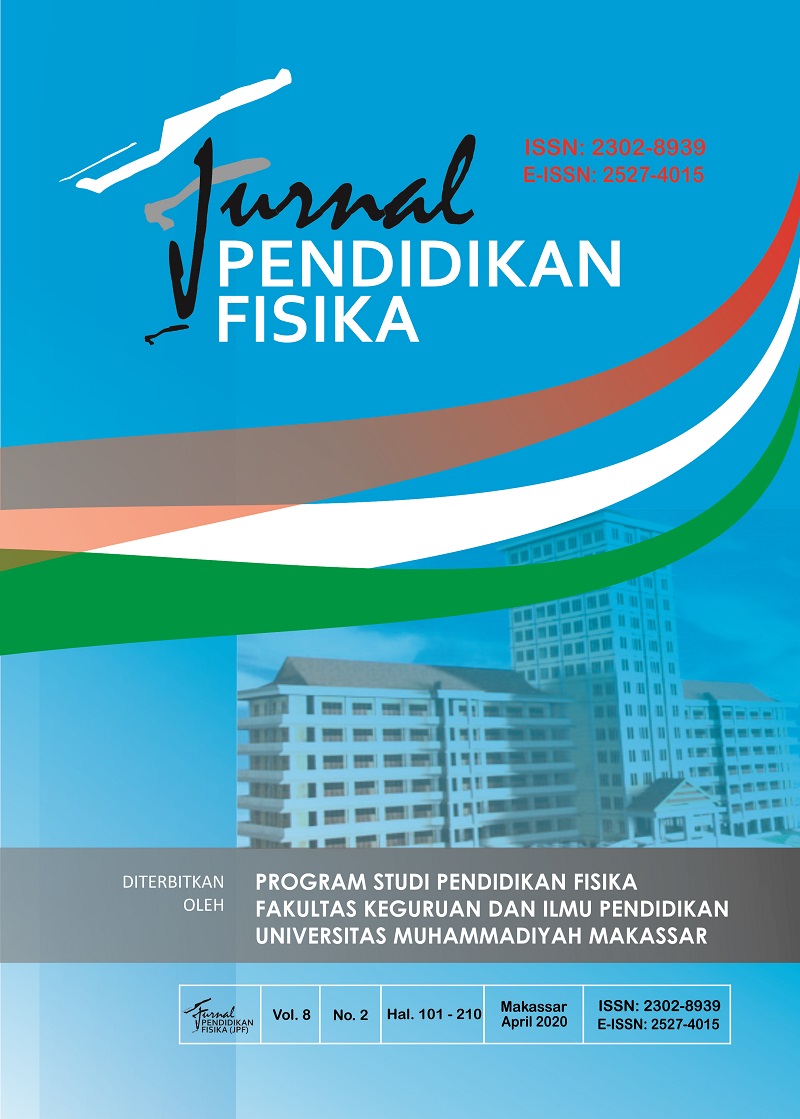The Role of Physics Teacher's Pedagogical Competence in the Implementation of the 2013 Curriculum at SMA Negeri 5 Maros
DOI: https://doi.org/10.26618/jpf.v8i2.3360
Teacher, Pedagogical Competence, Curriculum 2013
Abstract
This study aims to analyze the role of physics teacher pedagogical competencies in the implementation of the 2013 curriculum at SMA Negeri 5 Maros. Besides, to find out the factors that constrain and support the physics teacher's pedagogical competence in implementing the 2013 curriculum at SMA Negeri 5 Maros. To achieve this goal, research has been conducted with a qualitative approach. The subjects of this study were physics teachers at Maros 5 Public High School who had educator certificates. Research data collection using observation techniques, interview guidelines, and documentation. Data were analyzed using the Miles and Huberman technique consisting of data reduction, data presentation, concluding, and verification. The results showed that the physics teacher's pedagogical competence at Maros 5 High School in applying the 2013 curriculum out of the seven aspects that had to be mastered, the teacher was able to master the four aspects that were by the Minister of Education Regulation No. 16 of 2007 concerning Academic Qualification Standards and Teacher Competencies. These inhibiting factors are less than optimal training on increasing competencies for teachers, and lack of time in preparing lesson plans. While the supporting factors of this research are the existence of MGMP which is a place to increase teacher professionalism and teaching materials in the form of curriculum books in 2013.
References
Permendikbud, Peraturan Menteri Pendidikan dan Kebudayaan Republik Indonesia Nomor 36 Tahun 2018 tentang Kerangka Dasar dan Struktur Kurikulum Sekolah Menengah Atas/Madrasah Aliyah, Jakarta: Menteri Pendidikan Dan Kebudayaan Republik Indonesia, 2018.
S. Hidayat, Pengembangan Kurikulum Baru, PT Remaja Rosdakarya, 2017.
J. Musfah, Peningkatan Kompetensi Guru, Kencana, 2015.
Depdiknas, Undang-Undang Nomor 14 Tahun 2005 tentang Guru dan Dosen, Depdiknas, 2005.
Saryati, Upaya Peningkatan Kompetensi Pedagogik Guru Sekolah Dasar, Jurnal Administrasi Pendidikan, vol. 2, no 1, pp. 669-831, 2014.
B. D. Cahyotlogo dan Jumadi, Pemetaan Kompetensi Pedagogik, Profesional, Kepribadian, dan Sosial Guru Fisika SMA di Kabupaten Kulon Progo Pascasertifikasi, Jurnal Pendidikan dan Keilmuan, vol. 3, no 2, pp. 96-109, 2017.
D. S. S. Santoso dan L. Irawati,. Kompetensi Pedagogik Guru SMP Negeri Kaloran Kecamatan Kaloran Kabupaten Temanggung, Jurnal Ecodunamika, vol .1, no. 2, 2018.
M. R. Payong, Sertifikasi Profesi Guru Konsep Dasar, Problematika, dan Implementasinya, PT Indeks, 2011.
Trianto dan T. T. Tutik, Tinjauan Yuridis Hak Serta Kewajiban Pendidik Menurut UU Guru dan Dosen, Prestasi Pustaka, 2007.
N. Irwanto dan Y. Suryana, Kompetensi Pedagogik untuk Peningkatan dan Penilaian Kinerja Guru dalam Rangka Implementasi Kurikulum Nasional, Genta Group Production, 2016.
Permendikbud, Peraturan Menteri Pendidikan dan Kebudayaan Nomor 22 tahun 2016 tentang Standar Proses Pendidikan Dasar dan Menengah, Jakarta: Dapartamen Pendidikan dan Kebudayaan, 2016.
Permendiknas, Peraturan Menteri Pendidikan Nasional Nomor 16 Tahun 2007 tentang Standar Kualifikasi Akademik dan Kualifikasi Guru, Jakarta: Depdiknas, 2007.
N. Priatna dan T. Sukanto, Pengembangan Profesi Guru, Remaja Rosdakarya, 2013.
S. B. Djamarah, Guru dan Anak Didik dalam Interaksi Edukatif, Rineka Cipta, 2010.
Slameto, Belajar dan Faktor-Faktor yang mempengaruhinya, Rineka Cipta, 2010.
A. H. Saragih, Kompetensi Minimal Seorang Guru dalam Mengajar, Jurnal Tabularasa PPS UNIMED. vol 5, no 1, pp. 23-34, 2008.
B. A. A. Harfian, Kemampuan Guru Biologi dalam Pengimplementasian Kurikulum 2013 Ditinjau dari Kompetensi Pedagogik, Jurnal Biosfer, vol 2, no. 2, pp 11-17, 2017.
E. Ningrum, Mapping of Pedagogic Competency of Geography Teacher in Scientific Learning Based-On Curriculum 2013, Conference Series Earth and Environmental Science, vol 286, Universitas Pendidikan Indonesia, Juli 2019, pp 1-5.
Downloads
Published
How to Cite
Issue
Section
License
Copyright:
Authors who publish with this journal agree to the following terms:
1. Authors retain copyright and grant the journal right of first publication with the work simultaneously licensed under a Creative Commons Attribution-ShareAlike 4.0 International License that allows others to share the work with an acknowledgement of the work's authorship and initial publication in this journal.
2. Authors are able to enter into separate, additional contractual arrangements for the non-exclusive distribution of the journal's published version of the work (e.g., post it to an institutional repository or publish it in a book), with an acknowledgement of its initial publication in this journal.
3. Authors are permitted and encouraged to post their work online (e.g., in institutional repositories or on their website) prior to and during the submission process, as it can lead to productive exchanges, as well as earlier and greater citation of published work.
Licence:
Authors are free to:
1. Share: Copy and redistribute the material in any medium or format
2. Adapt: Remix, transform, and build upon the material for any purpose, even commercially.
The licensor cannot revoke these freedoms as long as the authors follow the license terms, which include the following:
1. Attribution: You must give appropriate credit, provide a link to the license, and indicate if changes were made. You may do so in any reasonable manner, but not in any way that suggests the licensor endorses you or your use.
2. ShareAlike: If you remix, transform, or build upon the material, you must distribute your contributions under the same license as the original.
3. No additional restrictions: You may not apply legal terms or technological measures that legally restrict others from doing anything the license permits.
Jurnal Pendidikan Fisika is licensed under a Creative Commons Attribution-ShareAlike 4.0 International License.






